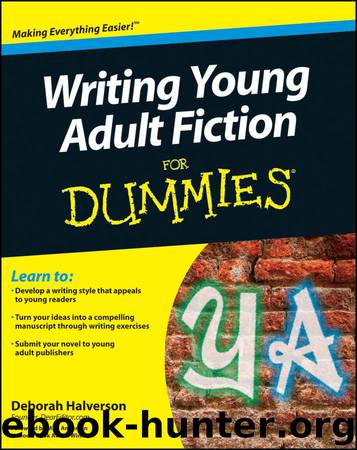Writing Young Adult Fiction For Dummies by Deborah Halverson

Author:Deborah Halverson
Language: eng
Format: mobi, epub
Publisher: John Wiley & Sons, Ltd.
Published: 2011-05-31T07:00:00+00:00
Getting fresh with your phraseology
A frequent flaw in the manuscripts crossing editors’ desks is clichéd writing. Characters roll their eyes, talk to brick walls, hope against hope, and couldn’t care less. Falling back on this kind of shorthand is easy because everyone understands the ideas behind these stock phrases, so you know kids will get your point. But when young readers don’t have to think very deeply as their eyes roll over the words, they don’t get engaged. They can easily sink into passivity, which is just a breath away from bored — a word that should make you shudder.
An engaging narrative voice uses fresh turns of phrase to keep things interesting. Be bold. Show teen readers respect. Challenge them with more vivid expressions. As much as you may joke about the teen psyche and recognize that you have reluctant readers in your audience, you must also remember that teens can be very sophisticated readers.
To pop yourself out of a cliché mindset, allow yourself to give in to the clichés in the first draft. When a scene is spilling out of you, the last thing you want to do is interrupt it! The second draft is when you get tough. Start by flipping open a good thesaurus. No, you’re not looking for word-for-word substitutions. Instead, skip down to the slang part of the thesaurus entry (sometimes labeled “nf” for nonformal usage) to remind yourself that there are other ways to say something, not just other words. This can open your mind to an unexpected way of saying something, which may prompt you to recast the whole sentence. Or maybe you’ll rewrite a whole paragraph or a whole scene or even give your character an entirely different personality. Consider this first draft sentence:
Kirk couldn’t care less about math, so he rarely did homework for his algebra class.
“Couldn’t care less” is cliché and doesn’t do more than convey my point. Bland voice alert! Looking up “unimportant” in the thesaurus leads to this:
Math cut no ice with Kirk, so he just blew off his algebra homework.
Better. It has a certain regional flair now . . . yet it’s still not particularly revealing. Readers now know Kirk doesn’t like math and won’t do it, but his personality is still off stage. Latch onto the attitude that peeks up in the phrases “cut no ice” and “blew off,” and push this thought a step further. What was it, exactly, that he hates about math? How would he blow something off?
Kirk had 45 algebra problems to simplify that night. 15x + 9 + 5x – 2 = . . . Ah, screw it all. He did the simplest thing and left the book in his locker.
Now that has personality. Readers get a feel for the math that’s torturing him, and then he does his knee-jerk teen drama thing and ditches the math book entirely. This gives you a richer peek into the character’s personality, and it’s far more engaging than the original line with its stock “Kirk couldn’t care less about .
Download
Writing Young Adult Fiction For Dummies by Deborah Halverson.epub
This site does not store any files on its server. We only index and link to content provided by other sites. Please contact the content providers to delete copyright contents if any and email us, we'll remove relevant links or contents immediately.
The Motivation Myth by Jeff Haden(4551)
Audition by Ryu Murakami(4124)
Adulting by Kelly Williams Brown(3701)
The Confidence Code by Katty Kay(3593)
Waiting in the Wings by Melissa Brayden(2820)
A Mind For Numbers: How to Excel at Math and Science (Even If You Flunked Algebra) by Barbara Oakley(2700)
Self-Esteem by Matthew McKay & Patrick Fanning(2614)
Nice Girls Don't Get the Corner Office by Lois P. Frankel(2609)
The ONE Thing by Gary Keller(2543)
The Dictionary of Body Language by Joe Navarro(2449)
Fooled by Randomness: The Hidden Role of Chance in Life and in the Markets by Nassim Nicholas Taleb(2434)
How to be More Interesting by Edward De Bono(2368)
Getting Things Done by David Allen(2332)
Designing Your Life by Bill Burnett(2292)
The Plant Paradox by Dr. Steven R. Gundry M.D(2060)
Police Exams Prep 2018-2019 by Kaplan Test Prep(2046)
What Color Is Your Parachute? 2015 by Richard N. Bolles(1937)
Dangerous Personalities by Joe Navarro(1900)
When to Jump by Mike Lewis(1814)
